Nigel Bird's Blog, page 62
June 15, 2012
One Man's Opinion: DEAD HARVEST by CHRIS F. HOLM
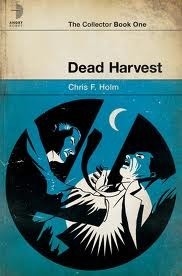
There’s a lot of class in the writing of Chris F. Holm. Read his short works in ‘Eight Pounds’ or his entry in ‘Pulp Ink’ and that will become immediately obvious to you.
Stepping up to writing a novel that’s going to engage and maintain the interest of the reader is a different matter entirely. I was confident Chris was going to pull it off, but one can never be sure.
Apart from loving the author, I must say that it was the cover on this book that clinched my purchase. It’s retro-chic with scratches to boo. It shows a guy reaching into the chest of another man within a circle of light. If I had a pound for every person who came up and expressed an interest in it and then told me they thought it was a second-hand classic, I’d be at least £20 better off. Maybe I should have charged.
The story is slightly outside my usual reading selections in that it involves souls and heaven and hell. Quite something to attempt as a debut novel, that’s for sure.
Sam Thornton is the protagonist. He’s a collector. He picks up the souls of the damned and delivers them upon request. I suppose he’s a kind of bounty-hunter of sorts, only there’s no bounty and the guilty are always going to be unsuspecting. The book opens with him at work, the inspiration behind the cover image.
Job done, Sam’s given another job.
This time it’s to collect the soul of a young girl who’s brutally murdered her family.
Problem is that when he reaches in to take her, he senses that she’s innocent. That being the case, he decides he needs to go against his bosses and save her – taking back an innocent soul will spark off a major war between Heaven and Hell, so it’s imperative that he does the right thing.
The right thing’s not easy to fathom, however, and it’s made a lot more difficult given that when he runs away with the aforementioned girl he becomes the most wanted of the police, the angels and demons alike.
What follows has the feel of a classically, hard-boiled, detective story that is full of the supernatural and has the energy of a chase thriller. And you know what? Chris pulls it off really well.
There’s a lot of information to take in at various points about the types of spirit entities that exist. Like pieces in a chess game, each has its own moves and rules. Some need bodies. Others have no free-will. They have different strengths and weaknesses.
Thankfully, these points are made with as little fuss or strained exposition as it’s possible to imagine. Sam keeps having to explain things to the girl he’s helping and to some of the people who help him along the way. What is important is that the rules were set and remained consistent, so that there was no confusion as the plot unfolded.
Another aspect of the tale, possibly my favourite one, is the story of how Sam became a Collector in the first place. It’s woven through the chase tale and gives the inhuman collector a very human feel. It’s a short story of sorts and I’ve already pointed out that Chris is an artist in that field.
I found the book to be extremely entertaining, often gripping and always kept me on my toes. I was also very satisfied and rather surprised by the resolution of the book. Which makes it a damned good read.
The good news is that this is the beginning of a series and the opening of book 2 is at the back of Dead Harvest.
My advice is that you should pick up a copy of this opener and I’m pretty sure you’ll give the follow-on serious consideration when it’s released.
Published on June 15, 2012 14:53
June 12, 2012
Win A Copy Of 'In Loco Parentis'

There was an old man from Dunbar
Who wrote in a colour called noir
His friends thought him crazy
And nothing but lazy
Didn't think that he'd get very far
OK. Poetic licence.
I'm not old, but I certainly am not young. And I'm not that lazy, not when it comes to the business of writing.
Anyway, I brought out In Loco Parentis as a tree-book last week. Which means I can give a copy away.
I'll send one to the winner of this competition.
I got the idea while teaching last week. I was covering a class and decided to try and do some work with them on Limericks. It's an easy form on the surface, but for youngsters it can be really difficult to get all the ingredients right at the same time. Sometimes the rhymes there without the pattern and so on. In the end, it was me who did the learning.
All you need to do to try and win my book is to write a limerick about yourself and post it in the comments. I'll pick the one I like the best and that's it. I guess the deadline is Saturday (for a moment there, I felt like God). Saturday it is.
Is it a prize worth winning? That's not really for me to say, but I think so. There are also some reviews up at Amazon from some very generous and hard-working folk who seem to think it is (thanks to those who've taken the time - it means a huge amount).
Good luck.
Published on June 12, 2012 01:42
June 10, 2012
Dancing With Myself: HJ HAMPSON interviews HJ HAMPSON
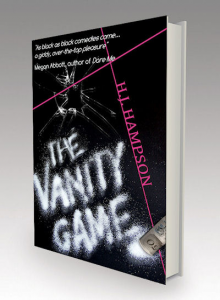
So, The Vanity Game is your fantastic debut novel, out June 11th 2012, published by Blasted Heath. What’s it about?
Why, thank you very much. It’s a dark comedy about a Premiership footballer called Beaumont Alexander. Beaumont is living the A-list lifestyle with his glamorous girlfriend Krystal McQueen, but an incident at a celebrity party sets off a chain of events that sees his life spiral totally out of control.
It’s a satire on celebrity culture.
Interesting, and what made you choose to write about footballers?
I think footballers are the epitome of the darker side of celebrity. A lot of them, particularly English ones, are plucked from shitty council estates when they are young and then suddenly find themselves earning more money than they ever could have imagined. It’s fairy tale for the fucked up 21st century. And footballers, out of all famous people, are most prone to criminality it seems. When I first started writing the book there seemed to be a lot of footballers getting accused of sexual assaults and stuff… but of course, all these cases always got dropped. And footballer’s girlfriends (WAGs)… many of them aren’t exactly down with the sisterhood are they?
Aren’t they? The character of Krystal McQueen, Beaumont’s girlfriend, changes a lot, is this a comment on the tyranny of the WAGs?
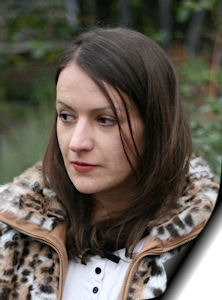 Not exactly… I’m not quite sure what the tyranny of the WAGs is, but it sounds good. Krystal is essentially a naïve girl, who gave in to the temptations offered to her by the celebrity wonderland she found herself in. The way she changes though… yes, I did intend this to be a comment on the way that some footballers’ girlfriends present themselves.
Not exactly… I’m not quite sure what the tyranny of the WAGs is, but it sounds good. Krystal is essentially a naïve girl, who gave in to the temptations offered to her by the celebrity wonderland she found herself in. The way she changes though… yes, I did intend this to be a comment on the way that some footballers’ girlfriends present themselves. You describe Beaumont as a ‘mega-brand’. Can we assume he’s based on David Beckham?
Absolutely not! Beaumont is much nastier than Becks. He certainly wouldn’t get an invite to a royal wedding. The ‘mega-brand’ is just one facet of Beaumont’s character, he has a little bit of John Terry in him, a bit of Christiano Ronaldo, a bit of Joey Barton, and lot of the dark voices that live in my head.
What I will say though is that one of the themes of the book is image versus reality, and David Beckham did inadvertently influence this. A few years ago I was on a coach in Thailand, heading to the Thai-Burma border, and stopped in this total backwater town for refreshments. I got out of the coach and was met by a huge billboard with David Beckham advertising Motorola phones. Beckham really is more famous than Jesus… but it is just an image isn’t it? No one really knows what is behind the image. I think that is quite fascinating.
Most fascinating. Did you just sit round reading celebrity magazines all day? Is that what influenced you?
Not really. My friend used to always buy OK! and the like when there was a big celebrity wedding, so I guess I absorbed some of that and they are satirized in the book. I was influenced by Andy Warhol and they way he made his own ‘superstars’, and generally made works about celebrity and death… I am a bit obsessed with Andy Warhol in fact. In terms of other writers, I’m a big fan of American writers like Brett Easton Ellis and Chuck Palahniuk, and, of course, Dostoevsky.
I say, is that cocaine on the cover?
It is, yes. Blasted Heath really are a rock’n’roll publisher, aren’t they?
There are a lot of drugs (plus sex and violence) in the book, so we thought spelling ‘The Vanity Game’ out in coke would give readers a good idea about what to expect from the novel.
And what next?
I have just handed a second novel in to my agent. It’s not really like The Vanity Game though. But I am considering writing a sort-of sequel to The Vanity Game.
Well thank you, it’s been fabulous.
Likewise.
Available at Amazon UK and Amazon US NOW
Published on June 10, 2012 06:56
Createspace And I
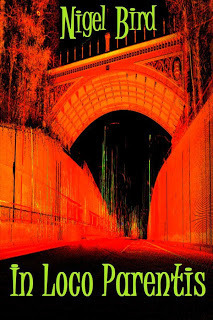
You'll probably know that I've embraced e-books with open arms, both as a reader and for publishing my work.
In spite of that, I retain that love of the physical book. The whole physical experience.
A few weeks ago, Chris Rhatigan suggested that we make a tree-book version of Pulp Ink 2 to compliment the Snubnose Press e-book release. It was an easy decision. Thanks to the support of Eric Beetner and R Thomas Brown who've done what was needed, that should be happening fairly soon. Can't wait.
When it came to my debut novel, In Loco Parentis, I felt I'd like to mark it in a way that would make it special. Attempting to make a tree-book seemed perfect.
I can think of 3 major reasons for making a physical book.
Firstly, I'm building a small collection of work for my children to have when they leave home. I'd love them to be able to remember me in a way that reflects who I feel I am, as well as having a barrel-full of moments to keep with them when I've gone. For that reason, I have 3 copies of everything I've done in print - Kuboa's Dirty Old Town, Mammoth's Best British Crime 8 and 9, The Reader, Crimespree Magazine and Needle Magazine.
Second, I've always loved the idea that I will one day walk into a charity shop and find a copy of one of my books on the shelves. Making a book would at least create the possibility.
And third, the people who keep saying they'd buy if they had a Kindle will now have a new avenue to ignore.
My encounter with Createspace was rather simple.
As ever, once I had the idea I went at it like surfer catching a wave. All gusto, no thought.
Thankfully, the package was easy to manage and had built in brakes.
"Sorry, this didn't fit on the page. You need to do something about it." That kind of message.
Eventually, realising that certain aspects of the warnings could be ignored, I pressed the send button and it was off.
I spent the whole of last week waiting for my copy. I dashed from work to disappointment a couple of times.
Yesterday it finally arrived, what was at that point the only paperback copy of In Loco Parentis in existence.
And you know what? It's beautiful. Just as I'd hoped. It is exactly as I'd hoped. Cartwheel City (on the inside only due to my bad back).
Now it's available, I'd love for some of you to share the experience. If you're up for it, the links are:
Amazon UK
Amazon US
Createspace
It's £7.99 or $9.99. As a 318 page book, that doesn't allow for much financial gain on my part, but that was my decision. I'd rather keep it cheap than put it out of reach.
As for Createspace, I'd recommend them. No reservation. They've done what they said they'd do, made my experience fairly straightforward and produced the novel perfectly to my taste. Thanks for that.
So, In Loco Parentis. Go forth and multiply.
Published on June 10, 2012 01:47
June 5, 2012
One Man's Opinion: HAM ON RYE by CHARLES BUKOWSKI
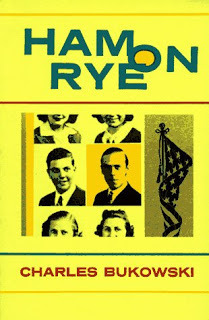
I'd been suffering from 'Reader's Block' when I picked up this offering from Charles 'Hank' Bukowski.
It didn't take more than a few minutes and a couple of pages to realise I was hooked.
To date, my main brushes with Hank have been through short stories and poetry, both of which I've loved. Why I didn't immediately pick up his longer prose, I have no idea. I have no excuses any more and there are more books in the post.
Henry Chinaski is the name of the German American boy at the centre of this book. He's a solitary boy. An outsider. For lots of reasons. One of them being that he's human and growing up in a time of depression and alienation.
Mr and Mrs Chinaski are tough cookies. They're intending to make their mark in a kind of middle-class way. They're proud. Hopeful. God-fearing.
Early on, Henry introduces other relatives. There's his alcoholic uncle and grandad. Another uncle is all washed up and dying already, even though he's in his early twenties. There's his aunt and his cousins, penniless and without a man in the house since the man raped a young girl and went on the run. It's not a healthy family.
Each of the characters is introduced in a short chapter. It's a collection of vignettes early doors, written sparsely and without pretence. The pieces have the weight and craft of great short stories, each closing with a punch that had me feeling the encounter. Seeing a bigger picture. Admiring the survivors of those tough times.
From family, he moves on to describe incidents with friends, sport, acne, alcohol, school, books, violence and girls. They're wonderfully drawn pictures. Seriously powerful.
Right the way through, a spade's a spade. Which makes me wonder why it's so bloody poetic. Perhaps it's something to do with the juxtapositions of one idea onto another, the layers of meaning and less-than-obvious comparisons.
Take this one chapter. Chinaski's in English class. His teacher, a beautiful thing, sits out front with her dress rising. In the back row, one of his classmates is jerking himself off. The teacher tells the class about the European tradition of literature and talks about the new Americans who are going to blow them off the page. Hank seems to be screaming out that what has come before is literary masturbation, what is about to arrive is the new breed. And the new breed is Chinaski and the new breed is Bukowski and A-men to that.
What Bukowski seems to be doing is creating the legend of himself. Taking his life and embellishing wherever he can or needs to. Maybe sometimes this goes too far, but at those points I found it useful to remind myself that it's a work of fiction and not biography. Sure, he uses poetic licence, but he is entirely justified in that.
It would have been great to hear Hemingway and Bukowski comparing fishing stories, by the way. 'Mine was this big,' Hem might suggest while holding his arms as wide as he could. 'That was nothing. Mine was bigger than this,' Hank might reply, dropping his trousers and admiring himself.
The story is fascinating. Brilliantly told. Refreshing and honest and dishonest and very well worth while picking up.
Read and weep.
Published on June 05, 2012 13:48
May 30, 2012
Dancing With Myself: KENT WESTMORELAND
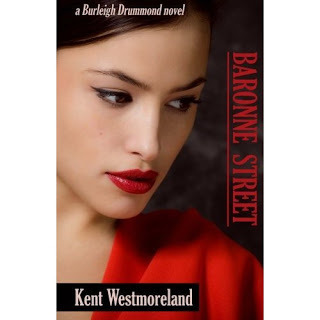
Sea Minor: For those unfamiliar with your novel BARONNE STREET briefly describe it.
Kent Westmoreland: The protagonist is Burleigh Drummond. Twenty-eight year old Drummond is the fixer New Orleans bluebloods and politicians run to when their problems become too complicated for their titanium-hearted lawyers.
In BARONNE STREET Drummond must employ his Machiavellian skills to solve and avenge the brutal rape and murder of Coco Robichaux, an ex-girlfriend. As Drummond investigates, he discovers Coco lived a clandestine existence in the city’s netherworld and had been drafted as an unwitting pawn in a plot to disrupt the upcoming mayoral election. As often happens with pawns, she was sacrificed.
Sea Minor: BARONNE STREET and Drummond seem to be a throw-back to Dashiell Hammett and Raymond Chandler. That’s assuming Hammett and Chandler stories had been published in modern day magazines like FHM, Esquire, and Details rather than Black mask and Dime Detective.
Kent Westmoreland: When I created Burleigh Drummond I wanted him to be a contemporary Phillip Marlowe - cool, a great wisecracker, and obsessed with the truth while seeming not to care, but haunted by his inability to make things right in an imperfect world.
However, contemporary doesn’t mean setting the stories in the present and handing him a smart phone. My concerns with Marlowe and his followers were they middle-aged, financially unsuccessful, angry, and alcoholics or near alcoholics. I made Drummond a fixer rather than a detective because it is a dubious job that would pay well. He’s not angry, but does suffer from a troublesome malaise because of the corruption and dysfunction he not only sees but participates in. Drummond does drink a lot, but because he’s young man on the prowl for female companionship.
 Sea Minor: I see the DNA of other fictional detectives in Drummond.
Sea Minor: I see the DNA of other fictional detectives in Drummond. Kent Westmoreland: Those guys would be James West from the classic TV series The Wild, Wild West and Sherlock Holmes.
What I always loved about James West is wherever he went people said “There’s James West, secret agent for the Secret Service.” It was so absurd. But I realized this would happen to Burleigh Drummond since he operates in a small city which only has three degrees of separation as opposed to the standard six. So I worked that concept into the stories. He seldom engages anyone who doesn’t know him or know of him. In one of the short stories a police detective mentions Drummond’s clients consider it a status symbol to say “Burleigh Drummond is fixing the situation for me.”
Until the BBC series Sherlock,Holmes and Dr. Watson typically have been portrayed as middle-aged or older. Holmes was twenty seven or twenty-eight when he met Dr. Watson and Watson began chronicling their adventures. Watson was few years older; in addition to being a physician Watson was an ex-military man who missed the excitement of war.
Also more often than not Holmes’ clients were wealthy blokes and government officials asking him to fix a situation for them(italics mine).
BARONNE STREET begins when Drummond is twenty-eight and has been working as a fixer for three years. His best friend and occasional partner, Morgan Cross, is obviously ex-intelligence, though it is never explicitly stated. Like Watson, Cross knows his way around guns, death, and boredom.
Sea Minor: One of the most fascinating characters in BARONNE STREET is Evan Charbonnet, a gay crime lord who controls the French Quarter. I haven’t come across a concept like this in other novels. Why did you create Charbonnet and his lavender mafia?
Kent Westmoreland: New Orleans has a large gay community which exerts considerable influence on the city. For a novel about New Orleans to be authentic that influence must be included. I have read several New Orleans based novels where token gay characters exist, but they’re cyphers; they serve no other purpose other than to have gay character. In BARONNE STREET (and the short story “Price Tag Attached”) I have created major gay characters and who are key to moving the plot forward.
Also gay characters play subtle, but important roles, in Chandler’s novels: The Big Sleep, Farewell, My Lovely, and The Long Good-Byeand Hammet’s The Glass Key. The Maltese Falcon’s trio of gay criminals is more obvious and important to the plot. So my gay crime organization is homage to Hammett and Chandler; I’ve taken the idea to the next level.
I discuss this subject in this incredibly amateurish video.
Sea Minor: Does a person like Charbonnet or a gay crime organization exist in New Orleans?
Kent Westmoreland: Some of the sleazier strip clubs in town are reputed to be clandestine brothels where drugs are easily available. They are owned by a gay business man. Assuming those innuendos are true, the owner would have to have very strong ties to politicians, the police, and the criminal element. Let’s say I took the prevailing gossip and ran with it.
Sea Minor: Several short stories feature Drummond. Please tell us about them.
Kent Westmoreland: Drummond appears in four short stories.
The earliest two “A Relatively Small Sum of Money” and “Part of the Plan” are set prior to BARONNE STREET. In Small Sum Drummond is hired to look for a missing heiress, but instructed to “not look too hard”. What he finds is a scheme to defraud the missing heiress; being Burleigh Drummond he doesn’t let that happen. Plan is more of a caper; it follows Drummond as he manipulates a failed justice system that allowed someone complicit in a child’s murder and rape to avoid jail.
The third “Ash Wednesday” is a re-telling of the Cinderella story and is set subsequent to BARONNE STREET. The events of the novel are briefly mentioned and as a result of those events Drummond is a darker character than in the first two stores and the novel. There are two versions of this story. The original was written for an erotica anthology and the safe-for-work version appeared in Thrilling Detctive magazine
The fourth story “Price Tag Attached” is collaboration with the prolific O’Neil De Noux. Characters from our fictional universes solve the murder of a shady antiques dealer. This story is set in what our sci-fi colleagues call an alternate timeline.
All of the stories are available in Kindle format from Amazon.com.
Sea Minor: Two final questions. Where are book and stories available? Do you have a web
Kent Westmoreland: BARONNE STREET and the short stories are available from Amazon at
And I have this website.
Thanks for interviewing me.
Published on May 30, 2012 15:11
May 26, 2012
Reader's Block

Reader's block. Curse it.
It's something I'm prone to.
A few weeks ago, I looked up at my shelves and tried to pick out a new title.
The shelves are full of them. Shiny spines. Names I love. Titles that entice. Promises I've made to myself.
But none of them appealed.
Too long, perhaps. Too noir. Too new. Too old. I had the excuses.
I looked at my kindle.
Too heavy. And the energy required to turn the thing on, I wasn't sure I had.
Reader's block.
I get it for lots of reasons.
First off, reading requires some effort. At least at the outset. Like swimming in a cold pool. Hell to get in, great when you're set and on your way.
It doesn't help that I have the mildest of reading problems. It's a scanning thing, no biggie. Big enough to put me off from time to time.
And there's work. Emotionally sapped, intellectually drained and physically worn, effort can be the last thing I want to make.
There's the kids. When the work slice of the pie has been taken, the children still need someone to play with and to cook for them, to sort out their issues and to put clean clothes in their drawers et al. Another slice of the cake gone.
I've just been working through Pulp Ink 2 as co-editor. It's been a wonderful experience and I am definitely leaning on Chris Rhatigan's strength on this one. He's tremendous. This time out, neither of us is there as a writer. We decided early doors that we'd concentrate on editing work.
In order to do that, it's meant reading each of the submissions to decide upon the stories to use. Sometimes it's taken 2 reads to make a decision or to find out what either Chris or I could see or couldn't see that meant the need for a fresh attempt.
The editing itself was pretty big this time. Not all the stories needed much change, but they all demanded concentration.
And there's the flick through to check on the changes.
Now there's the proof read.
Man. It's a real labour of love. It's labour, none-the-less. All of us who've been in anthologies or magazines or online should all spare a thought to those grinding away behind the scenes and those shiny covers. Hats off to each and every one.
Finally, there were the Smoke edits, hopefully soon to be signed off soon. Hopefully.
Which means I have lots of excuses for thinking 'sod it' when I look at those books I've been desperate to get into.
Reader's block.
Sleep or the television or time in fresh air all seemed more appealing than books.
I wonder if you get it.
If you do, what are your solutions?
I imagined having a few days of vegetating in front of the TV. That's not easy when most of it isn't to my taste. The Antiques Roadshow isn't even on at the mo.
I turned to a thick book I started a good while ago. Literary fiction. Dense. A change of pace. No dialogue. Not much plot. I wasn't far in before the tome seemed heavy in my hands and my eyelids even heavier. And the book's great. Beautifully winding. It's just that it had words in.
So another break. More TV. More frustration.
I thought about getting hold of some graphic novels. There was a lot of sense in that. For reasons I'm not sure about, that never got off the ground.
Coming up to the third week of the block, I went into my bedside cupboard.
Picked up a Bukowski.
Ham And Rye.
Very short chapters. Utterly engaging. Perfectly paced. Completely brilliant.
My writer's block was over.
Maybe I have my answer.
A dose of Hank.
And that reminds me, a sweet tangent this, of the letter we once got as poets from John Martin of Black Sparrow. Mmmmm.
So that could be it. It'll either be Bukowski of Proust (for as I was at the sea last night, I decided that would come soon).
If you have any tips for what a man with tired eyes should pick up when needing a gentle initiation, I'd love to hear them.
Thanks.
Published on May 26, 2012 01:33
May 25, 2012
Beware Your Shirt!
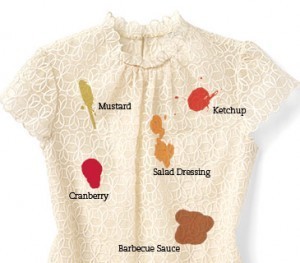
It's not possible to get a review like this one and not feel good about your work. It had me cackling to myself for several hours, including when I was trying to get to sleep.
Mr Kelly from Manchester, thanks for the smiles:
'5.0 out of 5 stars Beware your shirt!, 23 May 2012
By T. Kelly (manchester) - See all my reviews
(REAL NAME) Amazon Verified Purchase(What is this?)
This review is from: In Loco Parentis (Kindle Edition)
If I have a complaint about In Loco Parentis, I would have to say that it is so readable and compelling that I spilt food down two separate shirts and a pair of trousers whilst trying unsuccessfully to feed myself without having to stop reading.
I am not sure if this reveals bad manners on my part, or on Nigel's: for not allowing his poor readers any time to live their own lives whilst immersed in his stories.
Perhaps its just the sign of a really, really good read.
Encore... '
Encore, Mr Kelly. Encore.
Published on May 25, 2012 04:41
May 16, 2012
Writers and Resilience

Resilience.
It plays such a major part in our lives.
We’re at our most resilient when we’re young. It comes within the package that is the innate survival kit with which we are equipped at birth.
Take the example of a child learning to stand.
The child gets up, holds the position for as long as possible and then falls. Instead of packing in the standing thing there and then, they get up and try again. And again. And again. Eventually, for the vast majority of children, the end result is that they can stand.
You can apply that to any development we make. Without resilience, we’d just not get anywhere.
The processes of learning are best utilised in a nurturing environment. It’s something parents have to be careful about – allowing a child too much freedom to explore can have as damaging consequences as inhibiting opportunities.
There’s some irony here that it when children arrive at school that they are at risk of having their resilience squashed. Just as parenting has fine lines, so does teaching; the difference with teaching is that instead of a handful of children to think about who are all more-or-less operating within the one culture (that of the family) there might be thirty-plus of them and their backgrounds are likely to be pretty diverse.
As we grow older, age and wrinkle, the resilience we began with has likely taken a lot of knocks. It’s probably a lot weaker in adults than any child anywhere.
It’s certainly something that we need to keep alive all the same. If you’re a writer, the need to do so is crucial.
What follows here is not a generalisation. Rather, it’s a personal response to my own experience of the last week. If there’s anything you can relate to or can use and learn from, then I think I’ve achieved what I set out to. If I sell another couple of books in the process, that’s probably part of the reason for the post (I’d rather just say that than have it niggle at you as you read).
Saturday. In the evening, In Loco Parentis becomes available.
I’d liken it to being present at the birth of a child.
You don’t know how things are going to turn out until the book appears. You can have hugely aspirant dreams and disturbing nightmares at the same time and you don’t know which of those is to win out until you see some evidence. Maybe you even need someone to let you know.
Out comes the book. It’s there. Live. Not breathing, obviously.
And then the wait.
One of the things that’s very different now than from a couple of years ago is the ability to monitor and count sales as they come in. If you’re self-published, you’ll know what I mean.
So the book’s out and you tell folk and watch and wait.
A few sales give hope. And then it stops.
A day goes by.
Another sale on the clock.
Another day. Maybe one more sale.
It turned out that when I opened the floodgates there was very little water on the other side. There was no pouring. Not even a trickle. I had drips.
Like learning to stand.
Get up. Fall. Get up. Fall.
Write book. Damn. Write book. Damn.
Wednesday.
Even the drips have stopped.
So, what the hell to do.
I woke up this morning on the verge of self-pity. Self-pity for me is natural default. At least in the beginning. Depression is the next step.
So am I going to get depressed? Hell no. No fucking way.
And why not?
There are a few different reasons.
Firstly, I know I have resilience. I may have forgotten that over the years, but I do. I go to work every day, for example, to foster the resilience of the children I teach and hopefully add to the things they know in the process. I get up every morning. Write things down at night. Stories, blog posts, tweets etc. I do them.
So, this morning, I knew that to avoid the self-pity, I’d have to actively do something about it. Which is this piece.
Tip 1 then, when your armour feels thin, don’t lie down and wait for the point of the sword. Get yourself up and polish, repair or re-design your defences – whatever it is your good at, do.
Then analyse your own measure for success. Is producing a best-seller the only thing that’s going to pump up the ego? If it is, I’d suggest you either move the goalposts very quickly or find something else to do. Or maybe you should think about writing for yourself only (nothing wrong with that, by the way).
Tip 2. Great books don’t equal sales any more than sales equal great books. Remember that.
Experience is a useful tool and is good fuel for resilience. Experience has shown me that when a kindle self-published book is released, sales will be slow. There’ll be good days and great days and there’ll be famine. You can’t do the Joseph/Pharaoh thing about filling all the barns with corn, but you can remember the good meals.
Dirty Old Town has sold an average of 3.5 books a day for almost a year-and-a-half now. It came out of the traps like a dog with three legs, yet it’s still limping its way around the track. Beat On The Brat also came out with three legs, but it seems to decide to take long rests when the mood takes it – I don’t think it’s even at the first bend.
Tip 3 – books are like your own children. Each is lovely and wonderful in so many ways, but each is different and will find their own way in the world. Don’t expect them all to grow up the same. The difference is that you have much more control of your book as it doesn’t (mostly) have its own agenda.
Tip 4. Remind yourself of your successes.
This is easily forgotten. A positive word about your work made 6 months ago can never be rubbed out. The remark was there. Check it out every so often.
Tip 5.
This goes back to the nurturing aspect to resilience. In order to best take risks, the environment can be set up to allow them.
Nurturing in writing comes in different forms. Agents, publishers, editors, family, friends, peers, audience all play their part.
For me, whatever this says, it comes in the form of being appreciated in some way. As a writer it means that someone out there has got it. The message, I mean. That they were entertained and see aspects of the book in just the way I’d hoped they would. Maybe they’ve even seen and found more than I was hoping. Even better.
Take these review snippets:
‘If you've read any of his short work or his novella, Smoke, you know that Bird is a noir poet whose work is complex yet immediately satisfying. He follows up on that brilliantly in his first full-length effort.’ Chris Rhatigan
‘I loved the little wisps of paragraph, the short scenes that were woven together so intuitively. In Loco Parentis isn't a 'plotty' book, it's more like poetry (the fluid and easy spoken-word kind, street poetry, not the dense and inaccessible wordgames that fill the ruling-class anthologies). I think that's why it jumped my To Be Read pile so easily; reading it was like falling into a moving river (yeah, if you've seen that episode of I Shouldn't Be Alive where the father and son are dragged along by their faces under an ice shelf!)’ Nicki
‘Bird describes the violence, sex and drugs extremely well. You feel the immobiliser smack against your head, the sex is raw and complicated with a variety of emotions and motives as the characters struggle to find the comfort they desire, and the drugs bring the angst together like a fog swirling around the characters until they become totally lost in a world where right and wrong become impossible to differentiate.
Beautiful, painful and excruciatingly brilliant writing. Nigel Bird is a writer of the highest quality. Don't miss out.’ McDroll
‘IN LOCO PARENTIS displays Nigel Bird's ability to expose the raw experience of life. Hope, pain, fear, loss, rage, love, lust and regret all drive the characters, and will take root in the reader in this well written tale.’ RThomas Brown
I’m also going to paraphrase my good friend, major talent
and trusted reader AJ Hayes, who said something like – ‘It’s
brilliant. Exactly what I’ve come to love about your work. Go
for it.’
We all know that reviews make some difference to sales. More importantly to me, they tell me I’ve succeeded after all. Sell one copy for the rest of the week, sell 10 or a 100, whatever the number it won’t really matter so much to my own feelings.
By reading my work in a very short time, by putting pen to paper, by drawing out the essence of the book that I hoped was there and by adding nuances that I hadn’t seen myself, they’ve done me the greatest service of all. Reminded me that what I do matters to some. Given me the courage and the confidence to try and stand up and let everyone know that they might like it too. And to all of them, I don’t really know how to pass on my appreciation other than to say thank you.
I guess that tip 5 is to cherish the times you hit the target no matter how many times you miss the board.
Tip 6.
Remember when you were learning to stand?
Probably not.
To finish, I’m going to point to the achievements of Manchester City this weekend. I’m not a fan, but I was rooting.
Normal time is up and they are about to fail to win the Premiership in the way that no sane person would have predicted.
They need 2 goals in less than 5 minutes of injury time.
Score the first and they’re half way there.
Score the second and it’s in the bag.
To me, that’s resilience in a nutshell. Congratulations to Man City for their win.
Congratulations to any of us who can draw inspiration from that.
Here’s to success, in whatever form you may find it.
Published on May 16, 2012 02:44
May 12, 2012
Truth Or Dare
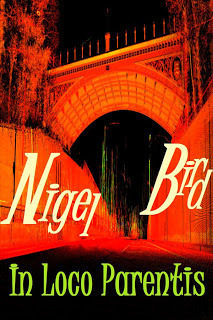
I'm not so brave as I once was. I'm certainly much less crazy.
Apart from getting older, it's helped by avoiding stimulants that have no more power than coffee or tea.
So I'm taking Truth.
In Loco Parentis is a novel. Teacher Noir. It's a bit like I imagine The Slap to be, only it would have to be considered to be a hard slap.
I'll put in some frills later.
You need to know a few things before clicking to make a purchase.
First off is that I did submit this to a couple of publishers. You may be able to guess who they are, but I'll not mention them in case it's bad form. The part you need to know is that this novel didn't make it past the gates - I had positive feedback, but it wasn't for them. Now, I hoped that it might come off and their response might mean that it's not the novel I hoped to write.
That said, it's the story I wanted to tell.
So, left with a choice of trying to find other homes and just going it alone, I decided on the latter.
A little bit like the character in the book, I'm an impulsive kind of guy. Impulsiveness has been a blessing and a curse in so many ways, but it's the way I am and I'm pretty happy with the way things turned out. So as soon as decided, I did it.
This happens to be my longest piece yet.
Smoke will soon be released by Blasted Heath; stretching myself to novella length was a challenge which I thankfully managed to pull off (by all accounts). Stepping up to 3 times that length, I can only say I think I managed it.
The other thing is that I'm not intending to make this free at any point. If I change my mind on that, you'll just have to forgive me, but I want to do this without the free promotion.
If you're interested, would like a read and feel the price of $2.99 / £1.99 is steep, just send me an email and I'll get a copy to you in Kindle format (or a PDF if you'd rather). You'd be most welcome to have one.
I'd like to thank those who've read the book in advance of publication for their support, effort, encouragement and comments.
Here are a couple of thoughts on the novel, which you might be interested in:
"All on his own, Nigel Bird has created a new sub-genre: Teacher Noir. In Loco Parentis delves into the darkness of the everyday through the eyes of painfully human and delightfully contradictory characters. This is vulnerable, brave fiction.
Bird is a noir poet who crafts characters you will love, hate, and become addicted to--all at the same time. Be prepared: In Loco Parentis is a rare and devastating book."
- Chris Rhatigan (Watch You Drown, All Due Respect, Death By Killing, Pulp Ink)
and:
"IN LOCO PARENTIS displays Nigel Bird's ability to expose the raw experience of life. Hope, pain, fear, loss, rage, love, lust and regret all drive the characters, and will take root in the reader in this well written tale." - R. Thomas Brown (HILL COUNTRY)
Those comments are very much appreciated given that they come from very fine writers. And in case you haven't heard, Watch You Drown is free in the US today (truly).
Which is about it for the Truth.
The Dare part? All I can do is dare you to take a look. Check out the intro and see if it works for you. It's not going to suit everyone's taste, but there's only one way to find out if that's yours or not.
Till soon.
Published on May 12, 2012 09:30



